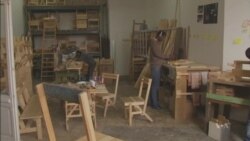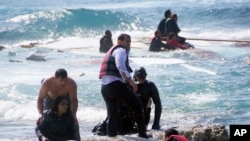Italy has proposed targeted attacks against people smugglers in Libya to counter the flow of migrants to its southern shores, while rescuers are still searching for survivors and bodies following the capsizing of a migrant boat Sunday, which was carrying up to 900 people.
That incident - one of the deadliest known shipwrecks of migrants recorded - has prompted the European Union to hold an emergency meeting later this week to tackle the growing issue.
One by one the rescue boats have been arriving back in port carrying their grim cargo. On the dockside in Valletta, Malta, lines of hearses waited, ready to take away the 24 bodies on board - just a fraction of the estimated 750 people who drowned off Libya Sunday. On deck, a group of survivors looked on as the bodies were unloaded.
Late Monday, Italian prosecutors ordered the arrests of two survivors of Sunday's migrant boat disaster on suspicion of people trafficking.
Authorities identified the suspects as the vessel's Tunisian captain and his Syrian first mate. They allege the duo was in command of the severely overcrowded boat when it capsized.
Hosting his Maltese counterpart in Rome, Italy's Prime Minister Matteo Renzi compared the smuggling of migrants to the historic African slave trade - and proposed unspecified action to target the traffickers inside Libya.
"The conditions to achieve peace through a military intervention in Libya at this time are not met. But, we talked about targeted interventions to destroy the criminal racket that is beyond all control," Renzi said.
The search continues 200 kilometers south of the Italian island of Lampedusa even though hopes of finding more survivors are diminishing fast. Survivors said hundreds of people were locked below deck.
European Union ministers meeting in Luxembourg proposed a 10-point plan to address the crisis, including doubling the size and funding for the existing "Operation Triton" patrol in the Mediterranean.
The EU’s President Donald Tusk announced an emergency summit of EU leaders Thursday.
“Some of the topics we will need to address as a matter of urgency are how to stop the human traffickers that cynically earn money by putting the migrants' lives at risk, how to step up our combined efforts of rescuing people in need, how to better help the EU member states most affected, and how to step up our cooperation with the countries of origin and transit," Tusk said.
But there are divisions. Britain supported scaling back search-and-rescue operations in October. British Home Secretary Theresa May emphasized the need to stop the people smugglers.
“It is right that we are all deeply concerned at the appalling loss of life that has taken place. But our focus must be fairly and squarely on dealing with the callous criminals that lie behind this vile trade in human beings," May said.
The EU ended the so-called "Mare Nostrum" search-and-rescue operation over concerns it was encouraging more migrants to make the journey.
But already this year more than 21,000 immigrants have arrived on European shores; more than 1,600 are thought to have died. The numbers show that people will risk their lives no matter what, argued Andrej Mahecic of the United Nations’ High Commission For Refugees.
“The push factors have all along been far stronger than pull factors. For us, the key priority at this stage is to have an adequate replacement for Mare Nostrum, for the search-and-rescue operation. That operation saved thousands of lives," Mahecic said.
The United Nations human rights chief accused Europe of a "monumental failure of compassion" Monday in its response to the soaring number of migrants who are drowning in the Mediterranean as they try to flee poverty and war in the Mideast and Africa for a better life in Europe.
Italy's Foreign Minister Paolo Gentiloni said Italy by itself can no longer bear the brunt of migrants arriving on its shores by the thousands.
"It is, I repeat, it is a European emergency," Gentiloni said. "It is not a problem to help Italy. It is a problem to help Europe. You cannot have a European emergency and an Italian answer."
'Horrified but not surprised'
Zeid Ra'ad al Hussein said he was "horrified but not surprised by this latest tragedy," the capsizing over the weekend of a boat filled with 700 migrants or more off the Libyan coast as it headed to the southern Italian island of Lampedusa. All but the 28 survivors who were rescued are feared dead.
"Europe is turning its back on some of the most vulnerable migrants in the world, and risks turning the Mediterranean into a vast cemetery," Zeid said. He blamed Europe's "continuing failure of governance" and lack of compassion.
The tragedies are not confined to Italy. In Greece, at least three people died, including a young child, after a migrant boat hit rocks off the coast of Rhodes. Local residents scrambled to pull the passengers to safety.
Migrant groups said calmer seas in the summer months will see many more dilapidated boats making the deadly journey to Europe.







